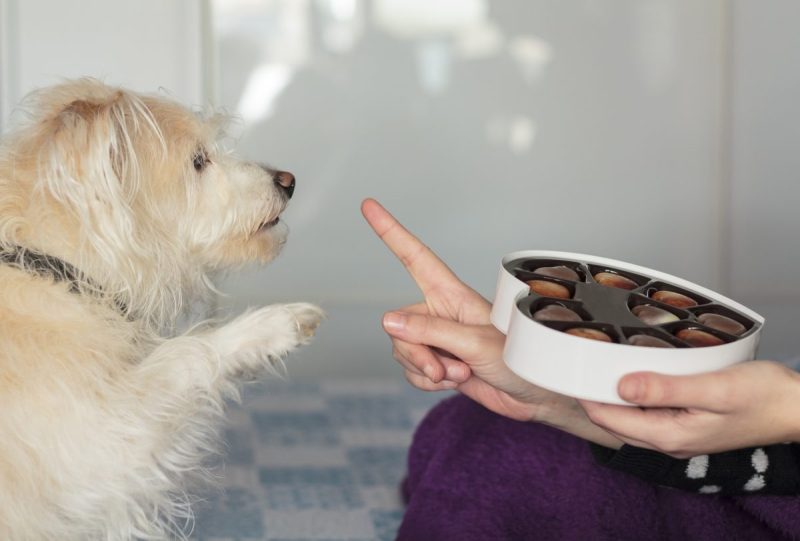
Sometimes, being a good dog parent means knowing when to say “no” to your pup, no matter how adorably they beg. Some foods are simply dangerous for dogs and can lead to serious health issues, even in small amounts. Here are 10 foods that are bad for dogs and should be avoided.
Most dangerous food for dogs
Below are the ten worst foods you can feed your dog:
1. Sugar-free foods containing Xylitol
At the top of the list is perhaps one of the most dangerous ingredients for dogs — a sneaky sugar substitute called xylitol. Found in everything from toothpaste and chewing gum to some brands of peanut butter, xylitol can be extremely toxic to dogs. While chocolate is well-known as a danger and typically requires a larger amount to cause serious harm, even small amounts of xylitol can trigger a rapid drop in blood sugar, seizures, and potentially fatal liver failure. It’s significantly more dangerous than chocolate and should be avoided at all costs.
2. Chocolate
Near the top of the list of bad foods for dogs is the one you’ve probably heard of most often — chocolate. Theobromine isn’t harmful to humans, but it’s the toxic part of chocolate for dogs. It’s found in all kinds of chocolate, but especially in dark chocolate and baking chocolate. It can cause vomiting, diarrhea, and excessive thirst. On the more extreme side, it can cause abnormal heart rhythms, seizures, tremors, or death. Save the sweets for yourself.
3. Bacon and fatty meat
High-fat foods like bacon, ham, or meat trimmings can cause pancreatitis in dogs. Since these meats are often high in salt content, too, they can cause upset stomachs and, in extreme cases, can cause dogs to drink too much water, leading to bloat, which can be fatal.
4. Salty foods
You may have heard that popcorn and pretzels are bad for dogs, but that’s usually only the case if those foods are salted. Salt can cause a condition called sodium ion poisoning, not to mention excessive thirst or urination. Symptoms of eating too much salt might include vomiting, diarrhea, high body temperature, and seizures. These are all in addition to bloat, as is the case with bacon. Salt toxicity in dogs can be fatal, so keep it to a minimum in the foods you share with your pup.
4. Garlic and onions
This one-two combo of foods doesn’t just give you dragon breath and repel vampires. These pungent ingredients are bad news for dogs. They can destroy a dog’s red blood cells, leading to anemia, if consumed in high quantities. This is a tricky one because a small dose might not do much harm. However, a large dose or regular small doses can lead to poisoning. Symptoms might include weakness, vomiting, breathlessness, and a loss of interest in food.
5. Milk, cheese, ice cream, and other dairy products
You may have slipped your dog a pill in a piece of cheese, but dogs aren’t built to process cow milk products. They lack the enzyme to break down milk sugar, and while some dogs are more able to handle dairy than others, many dogs are lactose intolerant. Dairy can cause vomiting, diarrhea, or gastrointestinal diseases in dogs. Furthermore, the fat content can lead to pancreatitis, as is the case with fatty meats.
6. Raw meat, fish, and eggs
Raw diets for dogs have become increasingly popular, with supporters claiming health benefits like healthier skin, cleaner teeth, and improved digestion. However, many veterinarians and the FDA discourage feeding raw meat due to the risk of harmful bacteria and parasites, such as Salmonella and E. coli. While these infections are more common in dogs with compromised immune systems, it’s often difficult to know if your dog is completely healthy.
If you’re considering a raw diet, it’s important to weigh the potential benefits against the risks. Safe handling and proper preparation is essential — simply tossing raw grocery store meat into your dog’s bowl is unsafe. Never allow your dog to sneak raw meat from counters or trash, and consult a vet or pet nutritionist before making the switch.
8. Grapes and raisins
This is a sneaky case of dangerous foods, as your dog has probably eaten some grapes or raisins without issue. However, grapes and raisins are known to cause renal failure in dogs. Your dog’s kidneys might start to shut down, causing vomiting, lethargy, and even death.
9. Sugary food
Sugary food isn’t good for humans, and it’s not good for dogs. Excess sugar can lead to gastrointestinal issues and, over time, contribute to problems like obesity, dental disease, and diabetes. Just like with people, a high-sugar diet can take a serious toll on your dog’s health.
10. Avocado
Much of the controversy around avocados when it comes to dogs revolves around persin, a substance avocados contain in their leaves, seeds, bark, and fruit. Persin can be toxic in high doses. However, dogs are fairly resistant to persin, It would take a lot of avocados for the persin to cause harm.
The real danger comes from the seeds, stems, and pits, all of which are difficult to digest. This can cause choking or gastrointestinal blockages, which can be fatal. If you have an avocado tree, make sure your pup can’t get anywhere near it or the fruit that falls to the ground. While avocado without pits can be safe in moderation, it’s high in fat and should be treated as an occasional treat, not a regular snack.
Other things dogs should never eat
Other products that aren’t necessarily food for you that your dog should stay away from include:
- Uncooked yeast dough
- Seeds and pits from fruit
- Raw potato
- Cooked bones
- Apple cores
- Alcohol
- Caffeine
- Human medicine
Don’t let your dog anywhere near these products, as they are toxic and can lead to potential poisoning, choking, gastrointestinal issues, and death. Stick to a diet approved by your vet, or research some healthy foods that you can share with your dog.







